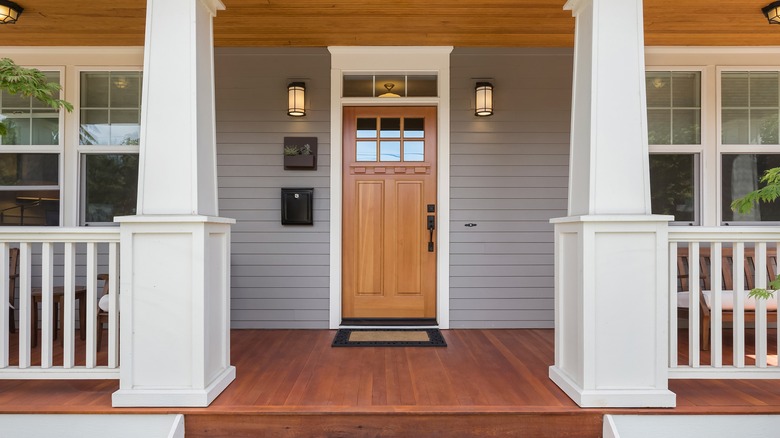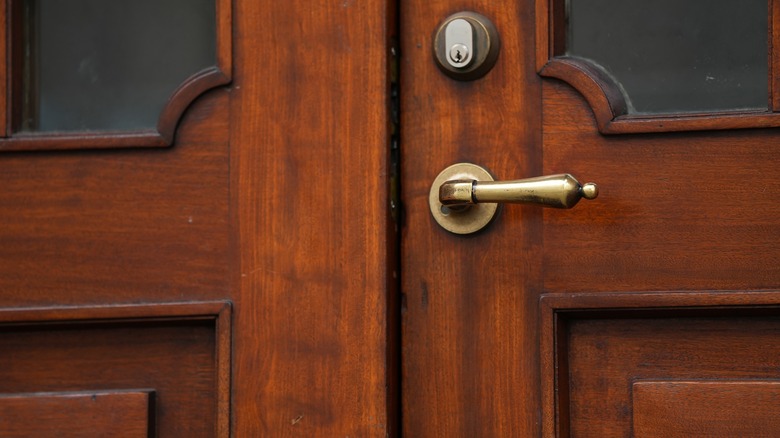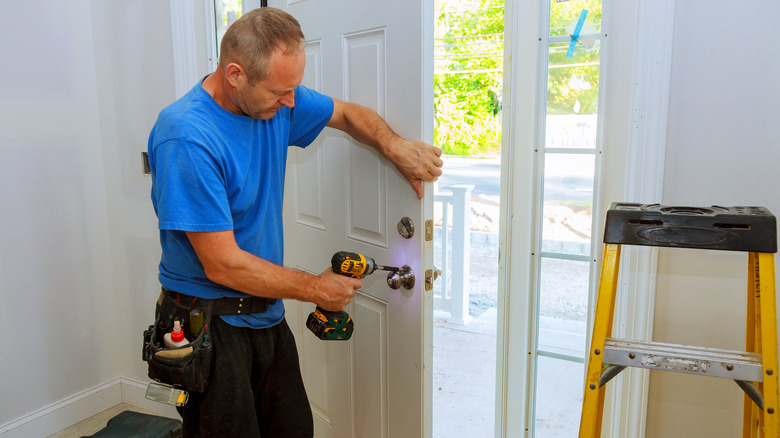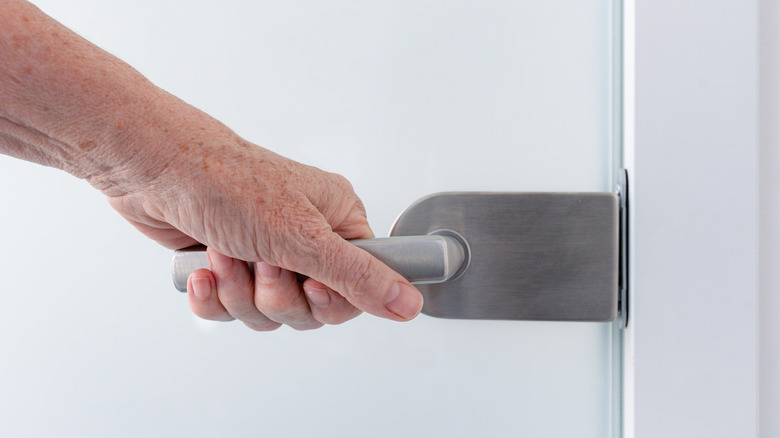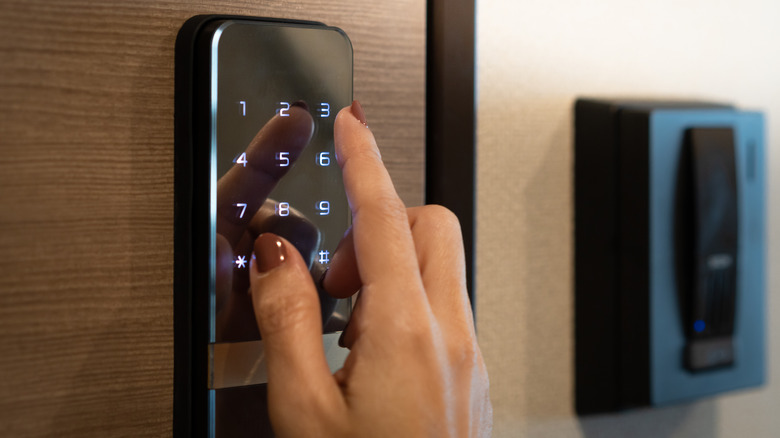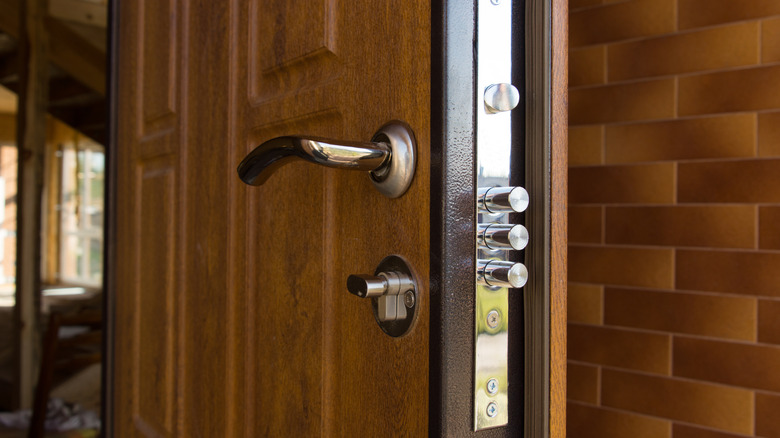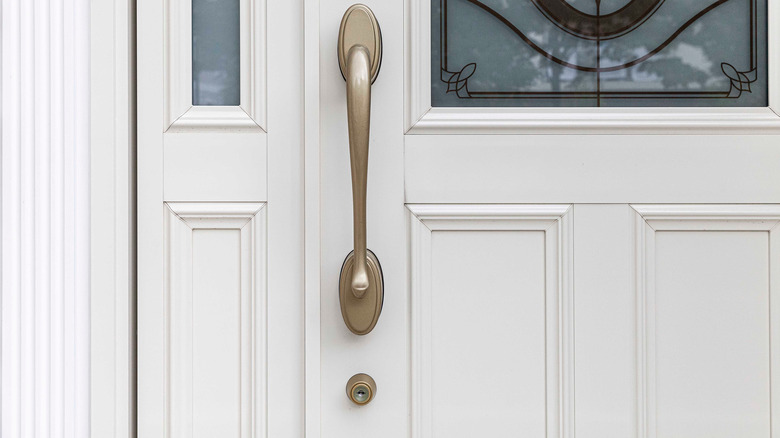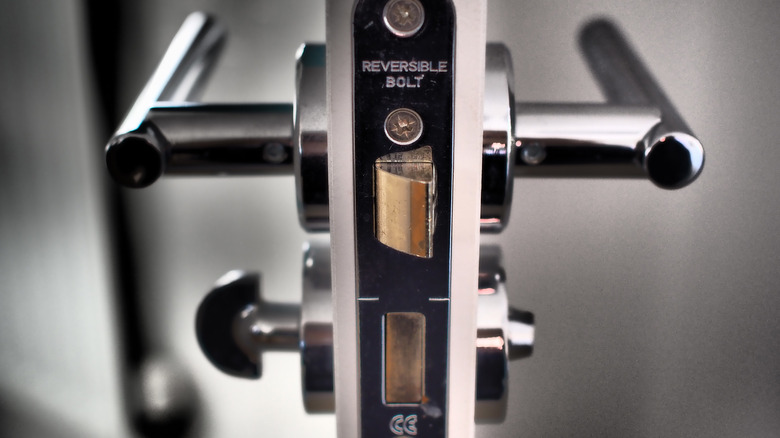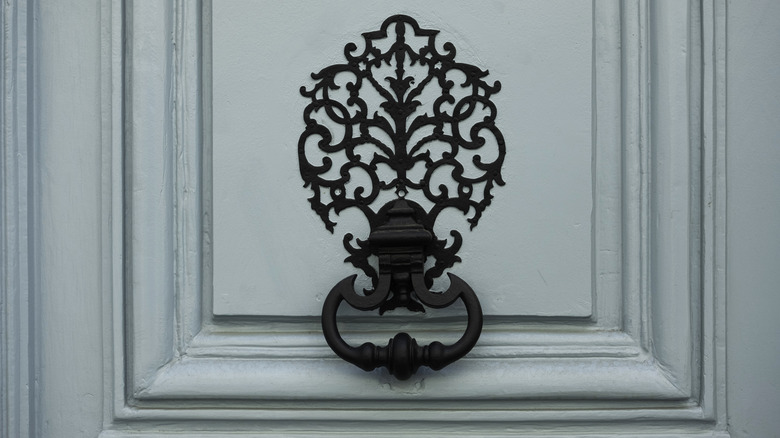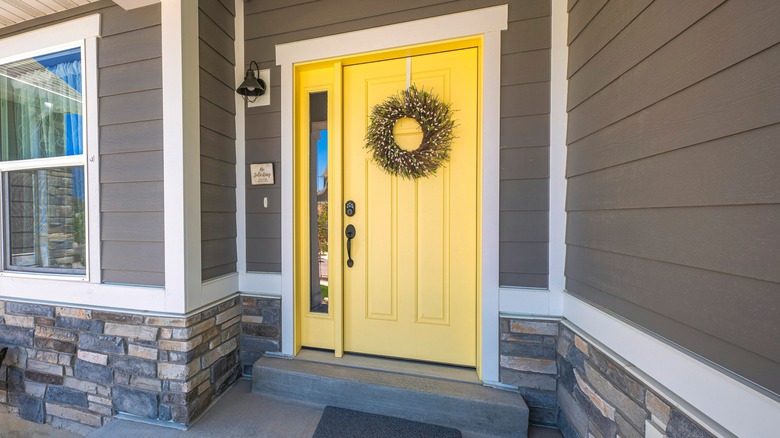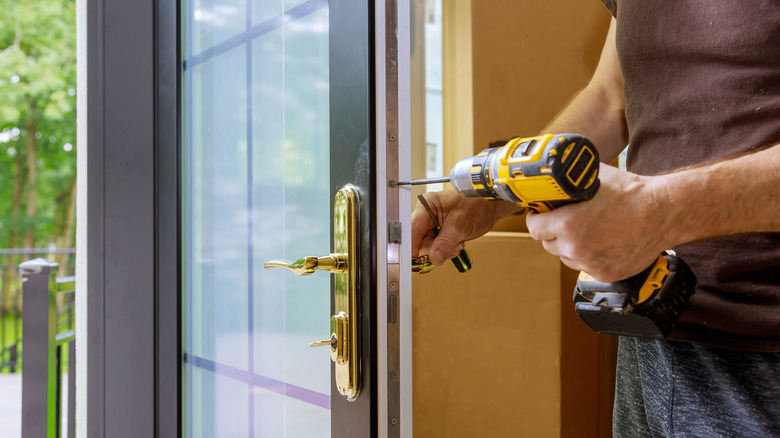Our Best Tips For Choosing The Right Exterior Hardware For Your Front Door
Deciding on the proper exterior hardware for your front door is mostly about security and functionality. Still, it's also a chance to make a statement about your personal aesthetic and display unique details. People often talk about how fun it is to choose door hardware that fits your home's style and looks great, but it's essential to think about the little things that will determine how well your choices work. Sometimes, we overlook several aspects of picking door hardware, like the compatibility of locks and handles, maintenance requirements, and the level of difficulty in installing new hardware, all of which impact your time and budget.
Instead of being a straightforward task that takes a few minutes, choosing your exterior door hardware requires careful consideration to avoid common mistakes. For example, while you may get pulled in by high-tech smart locks, their complexity and the need for professional installation can be tight for anyone on a budget. Similarly, the draw of durable, low-maintenance materials is critical when considering the hardware's long-term upkeep and value. By zeroing in on these vital but underestimated elements, you'll get all the knowledge you need to make an informed decision that ensures your door hardware is visually appealing, practical, and sustainable.
Embrace your home's style
Consider your home's architectural style so that you choose hardware that is a good fit. For a modern style, look for minimalist, sleek hardware with clean lines and metallic finishes like brushed nickel or stainless steel. On the other hand, traditional homes do well with more ornate hardware with classic designs and finishes like antique bronze or brass. If your home is somewhere in between, combine traditional and modern style elements, going for hardware with a warm finish and a simple design. Don't forget to take note of your windows and doors, including their material and color choices so that your hardware complements them.
Picking hardware that complements or matches your home's architectural style creates a cohesive look and boosts your property's curb appeal. This cohesive look ensures that every element outside your home, from the front door to the windows and garage, presents a unified appearance. This design choice will elevate your home's perceived attractiveness and value, making it stand out in the neighborhood. As another bonus, any hardware that complements the home's architectural style will subtly underscore any unique characteristics, turning your home into a reflection of your attention to detail and personal taste.
Consider the finish and weather resistance
When you start looking at finishes, make it a point to prioritize resilience and not just aesthetics. Any finish you pick needs to withstand exposure to your weather and climate so that it looks nice and lasts as long as possible. For example, bronze, brass, and matte black finishes are very visually appealing and have a reputation for being durable. Both brass and bronze have corrosion-resistant properties and are great to have if you live in a coastal or humid environment with salt air. Matte black finishes are usually powder-coated and lend a sleek look while resisting chipping or fading under heavy light exposure. Consider your climate's challenges — including snowfall, heavy rain, salt spray, or intense sun — and pick materials designed to withstand them. Doing so increases the odds that your hardware remains functional and attractive.
This is a strategic decision because a suitable finish will act like a barrier to protect the metal underneath it from rusting, tarnishing, or wearing down. These are very common issues with harsh weather exposure. This protective layer ensures your hardware stays aesthetically pleasing and operates as it should for years, making it cost-effective by reducing how often you have to replace it.
Security is key for a front door
Investing in secure, high-quality deadbolts and locksets can help keep you and your home safe, and many people forget about this step when trying to choose the best security system for their homes. Security should come before any aesthetic considerations. High-quality locks are designed to hold up against forced entry and tampering, and this gives your space a strong defense against break-ins. Any lock you pick should meet or exceed industry standards for security, like those rated by the Builders Hardware Manufacturers Association (BHMA). Look for locks with features that make them more secure, such as anti-pick pins, reinforced strike plates, and bump-proof mechanisms. However, while your main focus is security, you don't necessarily have to give up on style. Many companies have secure locksets and deadbolts in different finishes and designs to complement your home. If you have a doorknob lock, pair it with a deadbolt to enhance your security.
A durable, secure lock is a great deterrence for anyone looking to break in. Prioritizing security gives you peace of mind because you know your home has a layer of protection against unauthorized entry.
Ergonomics matter
Any hardware you choose should be comfortable enough to use daily, and ergonomics plays a massive role in this selection process. When you're looking at doorknobs, handles, or levers, physically test each one to see how they feel in your hand. Consider how much effort you have to exert to turn or pull, the grip you get, and how it fits into your hand. A knob or handle with a solid design should feel natural without causing discomfort or strain. This is especially important with bathroom levers, front doorknobs, and kitchen cabinet hardware. When you keep ergonomics in mind when you compare options, you're helping every interaction with your home be as comfortable and seamless as possible.
Ergonomic design with your door hardware is essential for keeping your home comfortable and accessible for everyone who drops by, including adults, children, and older people. Along with making your home's entry and exit points more seamless, it supports the occupants' well-being by reducing the chances of injuries or hand fatigue, as can be common with certain medical conditions like arthritis.
Integrate smart technology
Adding smart locks to your home gives you a blend of better security and convenience that traditional locks can't touch, but are they worth the hype? Smart locks let you lock or unlock your door using a tablet, smartphone, or voice commands, giving you a convenient way to get in and out of the house. This can be a timesaver for busy households. For those times you're loaded down with groceries or kids' sports gear, smart locks can go on your home automation systems, letting you automatically unlock the door as you approach it. This technology also gives temporary access codes for service professionals or visitors, eliminating the need to have duplicate keys. The ability to customize who has access to your home adds a layer of flexibility and security that makes these locks an innovative solution for your connected home.
Smart locks revolutionize your home's security by adding advanced features beyond what a traditional lockset offers. With remote access, you can lock or unlock your door from anywhere, giving you control over your home's security. Activity monitoring adds another layer of security because it sends notifications of who comes and leaves your house and when. This real-time information is critical for security and peace of mind, and by blending traditional security measures with modern technology, smart locks offer a comprehensive solution with a forward-thinking approach to security.
Consider versatility in your front door's hardware
Choose hardware for your front door that has enough versatility to accommodate a range of door functions and use cases. Consider hardware with different locking mechanisms, like keyless entry or traditional key-operated locks. You might also want to think about hardware that works with left- and right-handed door configurations. The goal is to select the hardware that adapts to different user preferences or security needs without you having to modify your doors. For example, lever handles come with a push-down mechanism that's easy for children or older adults to use. Also, selecting locksets that you can adjust to fit different door thicknesses or types means that the hardware still works even with changes to door material.
Selecting hardware while keeping any potential future home modifications in mind ensures that whatever you pick will stay relevant and stylish. You won't have to swap them out whenever you change something. This involves choosing hardware with a standardized mounting system, allowing for easy locking mechanism upgrades or changes without changing the door. Also, consider the durability factor. For example, any hardware that resists general wear and tear, even if you change your home's exterior, will keep working and look good. This strategic approach helps you maximize your investment while lowering any future costs attached to renovations or upgrades.
Look at the maintenance requirements
Looking at the maintenance requirements of any potential hardware you want gives you an idea of what you'll have to do to make sure that it lasts as long as possible. Different materials or finishes need varying care. For example, any polished surfaces might need regular cleaning to prevent tarnishing, while matte or brushed finishes can be more forgiving. Knowing the type of care each material demands — whether this is routine polishing, applying protective coatings, or lubricating moving parts – helps maintain the hardware's functionality and appearance. Picking hardware with corrosion-resistant materials or a protective finish will reduce how much maintenance you must do on it.
Deciding to go with a low-maintenance hardware piece will reduce the effort and time you put into general upkeep. This is an attractive draw for busy people who want a more hands-off approach to maintaining their homes. Some finishes, like satin nickel or oil-rubbed bronze, come designed to hide fingerprints and wear better than polished options. Zinc alloy or stainless steel resists wear and corrosion, adding durability without frequent re-coating.
Ensure handle and lock compatibility
Whether you're trying to replace an outdated doorknob or upgrade to a more secure option, choose a handle compatible with the locking mechanism. Doing so means you're more likely to get a seamless installation process with a reliable operation. Start by figuring out the type of lock system you have or want to install, whether it's a traditional deadbolt, smart lock, or a mortise lock system. Then research which handle sets will work with the system you have. The specifications include the distance between the lock cylinder and handle, size, and mounting requirements. Use manufacturer guidelines to match the handle set and lock mechanisms for the best results, or hire a professional if you're not comfortable doing it yourself.
A compatible handle and lock combination creates a cohesive unit that eliminates any weak points a potential intruder could exploit when attempting to break in. It's especially important that your hardware's lock mechanism fully engages without you having to force it. You also don't want a poorly fitted or misaligned handle. To get a smooth operation, look at how your handle interacts with the lock, considering the lock bolt's engagement depth and the economic design of the handle to give you a streamlined locking and unlocking experience. Additionally, a well-matched lock and handle set reduces how much strain the door components go through, leading to less wear and tear or maintenance.
Use exterior hardware as an accent piece
Take advantage of your hardware choice to add a one-of-a-kind touch to your front door. Think outside the box and go beyond traditional colors and designs to pick eye-catching, bold choices that reflect your style. This could mean going for hardware with an unconventional shape, intricate pattern, or vibrant color that stands out. Materials like polished brass, hand-forged iron, crystal, or glass can take a simple doorknob and make it unique. Also, thematic designs — like nautical, vintage, sleek futuristic, or rustic farmhouse — add an unexpected design twist to your doorway. This boosts your door's aesthetic appeal while also injecting a welcome flair.
Creating an accent piece with door hardware enhances your home's entrance, turning it into a fun focal point or conversation piece. Such a piece adds character and depth, whether it's an ornately crafted handle, a unique door knocker, or a brightly patterned lockset. This isn't just about functionality. It's about creating an entryway that evokes emotion or tells a story that invites your guests to appreciate the attention to detail you put into your home's accents.
Consider proportion and scale
Finding hardware that matches your door's scale and proportion will give you a cohesive, balanced look. Choosing something too big or not mounted at the correct height can easily overwhelm the door, while pieces that are too small can fail to have any significant impact. Measure your door's dimensions, including the thickness, when you pick out handles, knobs, and locks. For bigger doors, choose hardware that has a larger presence to keep everything balanced. A smaller door or one with a more delicate design will need more refined, sleeker hardware that complements it and doesn't overpower it. The goal is to pick hardware that feels integrated into the current door's design instead of being an afterthought.
Appropriately scaled hardware enhances your door's visual appeal and functionality. Hardware that fits the door's scale helps create an inviting entryway. When you carefully consider the scale, the hardware will accentuate the best features of your door, complementing the style. This balance is critical for helping you keep a cohesive design, and this is one of the easiest ways to boost your home's curb appeal.
Ease of installation in front door hardware
Considering how easy your new door hardware is to install is critical when looking at options, especially if you're on a tight budget. The complexity levels of your hardware will vary, and some require special tools and expertise to install them properly. For example, traditional doorknobs and locksets typically have user-friendly instructions so that DIY enthusiasts can install them with minimal tools. However, sophisticated systems — like advanced smart lock technology or high-security locks – may need a specific installation process that exceeds the average homeowner's skillset, requiring a professional. Before buying anything, consider your comfort level and capabilities with lock installations. Choose straightforward, simpler hardware that supports the DIY approach to minimize expenses.
Opting for easy-to-install hardware can significantly save on time and the expense of hiring a pro, and it's appealing for budget-conscious people who like a hands-on approach to improving their homes. Additionally, the easier the installation, the less likely you will make mistakes when installing your locks. However, you must recognize and prioritize expertise, especially with more complex systems. These advanced hardware sets typically have features that enhance your security but require precision installation. If you're not worried about your budget, investing in professional installation for these sophisticated systems is a good idea to maximize the lock's effectiveness.
Look for a strong warranty and support options
Prioritize any products backed by a strong warranty and a manufacturer customer service team that is easy to contact. This consideration increases the chance that you get long-term satisfaction and protection for your hardware. A comprehensive warranty usually covers potential malfunctions and defects, which is extremely important for high-use things like door locks or handles. Also, a responsive and helpful customer support team gives you an added layer of reassurance. You'll have assistance if you run into any issues, whether you have questions about the installation process or if a part fails. When companies offer long warranty terms and specialized support teams, it shows that they believe in the quality of their products and want their customers to be satisfied.
Accessible customer service and a strong warranty are essential parts of a smart purchase. A good warranty will offer coverage against deterioration or defects beyond typical wear and tear, potentially saving you from the cost of replacing or repairing hardware. Reliable customer support is crucial for having a go-to resource for maintenance tips, troubleshooting, or warranty claims. This level of backing is invaluable, especially for high-end hardware systems where more complex issues require specialized support.

